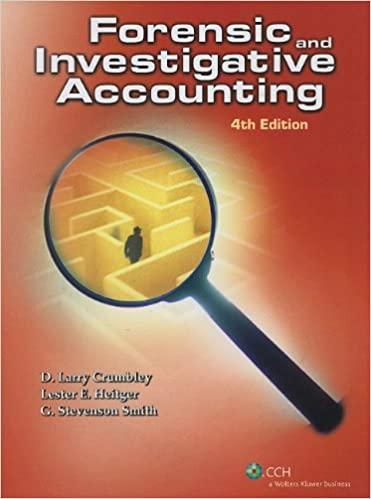Question
In the liquidation of a limited partnership, which of the following credits shall be paid last? Those owning to partners for their share in profits.
In the liquidation of a limited partnership, which of the following credits shall be paid last?
Those owning to partners for their share in profits.
Those owning to partners other than capital and profits.
Those owning to partners for their capital contribution.
Those owning to third persons.
After the date of corporate dissolution, what is the maximum period allowed by law to a dissolved corporation to complete its liquidation process?
2 years
4 years
1 year
3 years
In case of admission of a new partner in an existing partnership through investment to the partnership, which of the following scenario will result to bonus to new partner and asset revaluation?
The total contributed capital of all partners is more than the total agreed capital of new partnership while the total agreed capital of old partners is equal to the amount they contributed.
The total contributed capital of all partners is less than the total agreed capital of new partnership while the agreed capital of new partner is higher than the amount he has contributed.
The total contributed capital of all partners is equal to the agreed capital of new partnership while the agreed capital of new partner is higher than the amount he has contributed.
The total contributed capital of all partners is more than the total agreed capital of new partnership while the agreed capital of new partner is lower than the amount he has contributed.
If a partner who retired from the partnership receives less than the capital balance before retirement which also resulted to decrease in the capital balance of remaining partners, which is correct?
Revaluation surplus is recognized before the retirement.
The retiring partner gives bonus to the remaining partner.
An impairment loss is recognized before retirement.
The retiring partner receives bonus form remaining partner.
Which of the following will decrease the capital balance of a partner?
Drawing made by a partner.
Receipt of share in revaluation surplus from a partnership property, plant and equipment.
Share in partnership profit
Advances made by a partner to the partnership.
Which of the following statements pertains to partnership dissolution?
It refers to the process of converting non-cash assets of the partnership and distributing the total cash to the creditors and the remainder to the partners.
It refers to the end of the life of the partnership.
It refers to the change in the relation of the partners caused by any partner ceasing to be associated in the carrying on of the partnership.
It refers to the extinguishment of the juridical personality of the partnership.
Which of the following statements is correct when a new partner is admitted to an existing partnership by purchasing a portion of a capital interest of an existing partner?
It will result to revaluation or impairment of existing assets of the partnership.
The partnership is not dissolved by the admission of a new partner by purchase.
The partnership will recognize gain or loss on the transfer of capital from one partner to another partner.
It will just result to credit to capital of newly admitted partner with corresponding debit to capital of the selling partner.
Which of the following will not result to the dissolution of a partnership?
Retirement of a partner.
Insolvency of a partnership.
Admission of a new partner in an existing partnership.
Assignment of an existing partners interest to a third person.
In the liquidation of general partnership, which of the following credits shall be paid first?
Those owning to third persons.
Those owning to partners for their capital contribution.
Those owning to partners other than capital and profits.
Those owning to partners for their share in profits.
Which of the following items is not being considered in the computation of recovery percentage of unsecured creditors without priority?
Assets not used as collateral for any liability
Unsecured portion of partially secured creditors
Assets reserved for fully secured creditors
Assets reserved for partially secured creditors
Step by Step Solution
There are 3 Steps involved in it
Step: 1

Get Instant Access to Expert-Tailored Solutions
See step-by-step solutions with expert insights and AI powered tools for academic success
Step: 2

Step: 3

Ace Your Homework with AI
Get the answers you need in no time with our AI-driven, step-by-step assistance
Get Started


